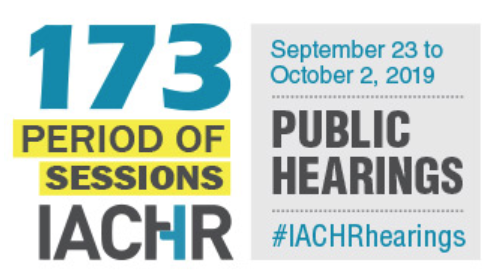The Inter-American Commission on Human Rights (IACHR) on Monday, September 23rd at 9:00am held a hearing titled "Serious Human Rights Violations in Cuba" that highlighted the persecution of journalists and human rights activists by the Castro regime. This was the first hearing of the 173rd Period of Sessions of the IACHR.
The participants in the panel that testified before the IACHR were: Laritza Diversent, Cubalex; Norberto Mesa Carbonell, Cofradía de la Negritud; Carlos Alejandro Rodríguez Martínez, Tremenda Nota; Pablo Díaz, Diario de Cuba; Luis Cino, Cubanet; and Caitlin Kelly, The International Institute on Race, Equality and Human Rights.
Panel of participants addressing the IACHR
Caitlin Kelly of Race, Equality and Human rights gave a summary of their report, "Premeditated Convictions: Analysis of the Situation of the Administration of Justice in Cuba." Kelly reported that Cuba's new Constitution has not addressed the harassment and persecution of human rights defenders and independent civil society observing that "there is a lack of respect for the rule of law, and a legal system that has many loopholes that permit the criminalization of people who speak against the government — human rights defenders, journalists and independent activists.” She also highlighted the case of prisoners of conscience Eduardo Cardet, and Roberto de Jesús Quiñones Haces.
Eduardo Cardet, national coordinator of the Christian Liberation Movement, was unjustly imprisoned on November 30, 2016 after being beaten up in front of his wife and children by the political police. Following the death of Fidel Castro on November 25, 2016 he head criticized the legacy of the Cuban dictator. Subjected to a show trial, stabbed by inmates, and denied proper medical care over the two years, five months and four days of his arbitrary imprisonment.
Roberto de Jesús Quiñones Haces, a lawyer and independent journalist with Cubanet, was taken to prison on September 11, 2019 in Cuba after being convicted in August 2019 by the Municipal Court in the city of Guantanamo for resistance and disobedience. In April 2019 the national police had detained and beaten him when he was covering the trial of two homeschooling pastors. He had made a formal complaint against the police who assaulted him. On August 23, an appeals court upheld his conviction, without granting him a further oral hearing.
Norberto Mesa Carbonell, co-founder of the Cofradía de la Negritud, described being repeatedly harassed, detained and questioned without due process in retaliation for his civil rights activism.
Pablo Díaz of Diario de Cuba discussed rising repression against independent journalists and rising numbers seeking asylum. Both Pablo Díaz and Luis Cino of Cubanet made clear that not only are independent journalists subject to threats and violence from state forces, they are also denied due process rights and other rights of persons arbitrarily detained.
Carlos Alejandro Rodriguez of Tremenda Nota raised the case of Roberto Quiñones, a journalist who began serving his one year prison sentence on September 11 ,2019 after being convicted of "disobedience." Roberto was arrested arbitrarily in retaliation for his reporting. In the question and answer session that followed Carlos made the following observation: "Education in Cuba is free but only if you share the ideals of the" revolution. Therefore the freedom of thought or expression against the political principles of the revolution is not valid and there is discrimination "
Laritza Diversent of Cubalex observed that "legally there is no reform or government intentions to recognize that racial discrimination exists in Cuba. Racial discrimination is not defined in the criminal code as a crime that makes it impossible for society to demand justice in this regard."
Diversent also highlighted that she was following the plight of 59 independent journalists in Cuba, of which 41 belonged to six different alternative independent media groups. She documented that 86% of those detained were required to strip naked. According to Laritza 38% of them were female and 19% of them were menstruating when required to disrobe. She cites the example of independent journalist Adriana Zamorra, who was pregnant at the time, when she received threats both against herself and her unborn child.
The Inter-American Commission on Human Rights (IACHR) is a principal and autonomous organ of the Organization of American States (OAS) "whose mission is to promote and protect human rights in the American hemisphere. It is composed of seven independent members who serve in a personal capacity. Created by the OAS in 1959, the Commission has its headquarters in Washington, D.C. Together with the Inter-American Court of Human Rights (“the Court” or “the I/A Court H.R.), installed in 1979, the Commission is one of the institutions within the inter-American system for the protection of human rights."
The IACHR "has issued a total of seven country reports on Cuba—five concerning the situation of human rights in the country, and two about political prisoners and their families. The most recent of those reports was issued in 1983. Since then, the IACHR has continued to monitor the situation of human rights in Cuba through its various mechanisms, which have included granting precautionary measures, issuing press releases, and addressing Cuba in Chapter IV of its annual report every year since 1985."



